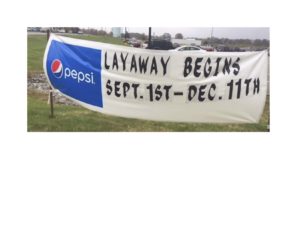Are You Getting Value For Cash Outlays Or Are You On The Layaway Plan?

If you’re making an unrefundable cash outlay, you should be getting value, right then and there. But if you’re making progress payments toward some future deliverable, you’re really on a kind of Layaway Plan, and your agreement should reflect that distinction.
Years ago, most every store had one. Some still do. This photo was taken recently near the parking lot of a big-box store in the heartland of America. It works like this: You pick out something you want to buy, pay a small amount on it, and the store will hold it for you until you paid the balance of the purchase price. You’ll come in once a week and they’ll record your payment in a little book. Finally, on the glorious day you make your final payment, you can take your item home with you.
There are two significant facts about this plan:
- You have to complete your part of the deal before the item is handed over to you.
- If you don’t get the item, your payments are refunded to you (usually less a nominal “restocking fee.”)
The whole process is an exercise in deferred enjoyment and careful budgeting. It’s the exact opposite of credit card buying where you take your purchase home on Day 1 and enjoy it right away, and then figure out how you’re going to pay for it over time.
This metaphor can be helpful when you’re making regular payments for ongoing work. There are two distinct kinds of work done by a contractor, vendor or even an in-house team: Are they “doing work for” you or are they “building something to deliver” to you.
Conceptually, these are two very different things: When a contractor or vendor or team is doing work on behalf of the client, the client presumably receives benefit and value as and when the work is being done. The work and payment for it can be seen as a series of smaller transactions and payments represent compensation for value received at the time.
By contrast, when the work is building some item — a product or system — to deliver to a client, there’s no real value received by the client until the whole thing is completed, delivered and working. It follows that the payment due date ought to be deferred to the time when the item is actually completed and delivered in a state where full value can be enjoyed by the client.
In many business situations, this distinction has gotten blurred when payment for building things is structured as periodic payments, tied to the passage of time or the completion of milestones, but before the client actually gets any value. If the project is not completed, the client is still out most of the contract price it has paid along the way, even though it didn’t get what it bargained for.
Applying the Layaway Metaphor to these “build-to-deliver” situations would turn that concept on its head: No money would actually be due unless and until all work is completed and delivered to the client. Progress payments could still be made — but as advances to be refunded in the event the project is not completed.
- VCs, investors, lenders. As an alternative to a big “round of funding,” handed over based on little more than a compelling presentation, progress payments could be structured as advances to cover actual legitimate expenses incurred by the startup. Sure, those monies would be spent and difficult or impossible to recover if the business goes belly-up, but the re-characterization as an advance would encourage tighter discipline (and have the bonus effect of reducing loose, cavalier — not to mention corny and irritating — startup talk about “the burn” — burning money, the burn rate).
- Vendors. A similar design could be implemented for vendor agreements: Progress payments would be made for milestones, but structured as advances, the actual due dates for which would be deferred and tied to the full implementation of the deliverable and the extent to which they meet the expectations as set forth in the agreement.
- Team bonuses. Instead of bonuses valued and paid in dollar amounts at year-end, your company could award “notional units” based on the work completed, but defer the valuation and redemption of those units for cash to some future date after the implementation of the deliverables reveals the extent to which they help the organization as anticipated.
It’s OK to pay out money you know you’re not going to get back, so long as you’re getting value for every payment. It’s also ok to make progress payments for work done to build something for you — the Layaway Plan. Just make sure your agreement is structured correctly to properly characterize those payments so you can recover them if you don’t get what you bargained for.
